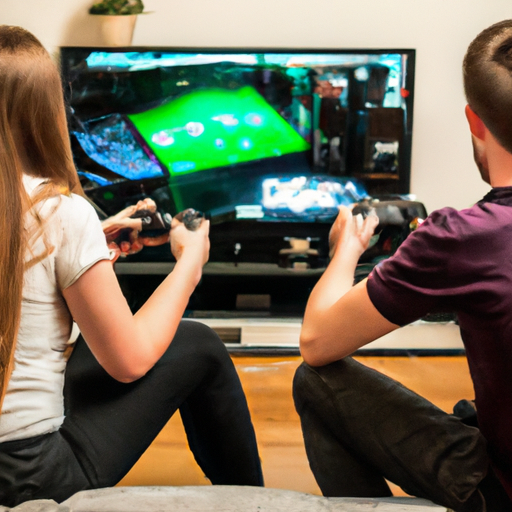How Does Gaming Affect Relationships? 10 Powerful Solid Factors to Remember
How Does Gaming Affect Relationships: Introduction
How does gaming affect relationships? This is a question that has become increasingly relevant as video gaming has grown into a mainstream form of entertainment, with nearly half of the U.S. population identifying as gamers. While the gaming community has expanded, its impact on interpersonal relationships is a subject of ongoing discussion and scrutiny. In this article, we delve into the multifaceted ways in which gaming can both positively and negatively affect relationships.
It’s important to note that gaming is not a monolithic experience. It can be a solitary activity, a way to connect with friends or even a competitive endeavor. As a result, its impact on relationships can be complex and varied, much like the games themselves.
There are relationships that have blossomed thanks to shared interests in gaming. For some, gaming is a bonding activity, a shared pastime that enhances their connection. Others find that cooperative gameplay or gaming as a “team” can build camaraderie and deepen bonds.
On the flip side, excessive gaming or unhealthy gaming habits can also put a strain on relationships. Issues such as neglect, poor communication, and time management problems can arise, impacting not just romantic relationships but friendships and family dynamics as well.
Therefore, the relationship between gaming and personal interactions is not straightforward. It requires an understanding of both the psychological effects of gaming and the nuanced dynamics of interpersonal relationships. Keep reading as we explore this intriguing intersection further, offering insights backed by research, expert opinion, and real-life experiences.
Impact on Communication
Gaming has a multifaceted impact on communication within relationships. On one hand, it can foster enhanced communication through shared interests and experiences. When both partners enjoy gaming, it provides a common ground for conversation, planning strategies, and even participating in online communities together. Engaging in cooperative gameplay can strengthen communication skills by requiring effective teamwork and coordination. Furthermore, gaming can serve as an icebreaker in the early stages of a relationship, making it easier to connect with one another.
However, there are negative aspects to consider as well. Excessive time spent gaming can lead to a lack of communication or conversation outside of the gaming world. When one partner becomes engrossed in a game, they may withdraw from their significant other, leading to feelings of neglect and disconnection. Gaming can also be a source of miscommunication and frustration, especially when disagreements arise over gaming habits or competitive gameplay. It is important to strike a balance and ensure that gaming does not become a barrier to effective communication in the relationship.
Social Interaction
While gaming can offer opportunities for positive social interactions, it also presents challenges that can negatively affect relationships. On the positive side, gaming can facilitate social connections through multiplayer experiences. Playing games together can provide a shared activity that strengthens bonds and creates lasting memories. It can also be an avenue for meeting new people and expanding one’s social circle through online gaming communities.
However, negative social interactions can arise from gaming as well. Excessive gaming can lead to isolation and a withdrawal from real-life social interactions. If one partner becomes heavily engrossed in their gaming world, it may limit their availability for social activities or spending quality time together. Additionally, disagreements over gaming preferences or competitiveness can strain social interactions and create tension within the relationship. It is important to strike a balance, ensuring that gaming does not replace or interfere with real-life social connections.
How Does Gaming Affect Relationships: Quality Time
How does gaming affect relationships? This is a question that has become increasingly relevant as video gaming has grown into a mainstream form of entertainment, with nearly half of the U.S. population identifying as gamers. While the gaming community has expanded, its impact on interpersonal relationships is a subject of ongoing discussion and scrutiny. In this article, we delve into the multifaceted ways in which gaming can both positively and negatively affect relationships.
It’s important to note that gaming is not a monolithic experience. It can be a solitary activity, a way to connect with friends or even a competitive endeavor. As a result, its impact on relationships can be complex and varied, much like the games themselves.
There are relationships that have blossomed thanks to shared interests in gaming. For some, gaming is a bonding activity, a shared pastime that enhances their connection. Others find that cooperative gameplay or gaming as a “team” can build camaraderie and deepen bonds.
On the flip side, excessive gaming or unhealthy gaming habits can also put a strain on relationships. Issues such as neglect, poor communication, and time management problems can arise, impacting not just romantic relationships but friendships and family dynamics as well.
Therefore, the relationship between gaming and personal interactions is not straightforward. It requires an understanding of both the psychological effects of gaming and the nuanced dynamics of interpersonal relationships. Keep reading as we explore this intriguing intersection further, offering insights backed by research, expert opinion, and real-life experiences.
How Does Gaming Affect Relationships: Addiction and Prioritization
Addiction
The question, “How does gaming affect relationships?”, often leads us to consider the issue of addiction. Gaming addiction is a form of behavioral addiction, similar to gambling addiction. When gaming starts to interfere with daily life and responsibilities, it’s a red flag.
Signs of gaming addiction can include excessive time spent gaming and neglect of work or school. Additionally, withdrawal symptoms when not gaming can also be a sign. For example, your partner may become agitated when they can’t play or even sacrifice sleep for gaming.
This addiction can hurt relationships by reducing the quality time spent together. Emotional distance between partners can grow. And it’s not just romantic relationships that suffer; friendships and family connections can be affected too.
If weekend plans or family dinners are often disrupted due to gaming, it’s time for a critical evaluation. Treatment specialists can help provide coping mechanisms and restore balance in your relationships.
Prioritization
Prioritization is another issue when discussing how gaming affects relationships. When gaming becomes more important than your partner or family, problems arise. A person may consistently choose gaming over spending time with loved ones.
For example, you might skip your child’s school events to game. Or you could cancel date nights to play online games. This neglect can lead to feelings of resentment and emotional strain from the other party.
These feelings may manifest as increased arguments or decreased intimacy. You might also notice an overall feeling of emotional disconnect. Addressing this issue requires open communication and compromise.
Couples may decide to set specific boundaries, like times dedicated to gaming and times reserved for each other. In extreme cases, consulting a relationship counselor or psychologist may be beneficial.
Mindfulness about the time and emotional energy spent on gaming versus nurturing relationships is key. Both partners should feel valued, ensuring that gaming becomes a shared interest or a respected hobby, not a point of contention.

How Does Gaming Affect Relationships: Conflicts and Arguments
Disagreements Over Gaming Habits
Conflicts often arise in relationships when there are differing opinions about gaming. Whether it’s about the amount of time spent playing, the types of games chosen, or the platform used, these disagreements can escalate if not addressed. For example, one partner may prefer action-packed games while the other enjoys story-driven titles, leading to tension when deciding what to play together. Open dialogue and compromise are key. Discussing each person’s gaming preferences openly can pave the way for a more harmonious relationship.
The Impact of Competitiveness
Another common source of tension is competitiveness. If one partner is ultra-competitive, always pushing for the win, it can breed resentment and stress in the other partner. Imagine one partner constantly criticizing the other’s gameplay or gloating excessively when they win. Such behavior can detract from the enjoyment of the game and strain the relationship. To prevent this, it’s important to set boundaries and communicate openly about what’s acceptable and what isn’t when it comes to competitive gaming.
Role of Gaming in Long-Distance Relationships
Building Connections Through Online Play
Gaming can be a lifeline in long-distance relationships. With the help of online multiplayer games, couples can share experiences even when miles apart. Imagine exploring a virtual world together, completing quests, or teaming up against online opponents. This can foster a unique sense of closeness, despite the physical distance, by providing a shared activity that both partners can look forward to.
Risks and Downsides
However, relying solely on gaming for connection comes with pitfalls. The virtual interaction may start to replace other meaningful forms of communication like phone calls, texts, or video chats. This imbalance can result in a shallow connection. For example, while you might be racking up wins together in a game, you may miss discussing important aspects of your day or deeper emotional issues. A balanced approach is crucial. Complement gaming sessions with regular video calls or even old-fashioned letters to maintain a well-rounded, intimate relationship.

How Does Gaming Affect Relationships: Supportive Gaming Relationships
How Does Gaming Affect Relationships: Supportive Gaming Relationships
Bonding Through Shared Interests
When both partners in a relationship are gamers, the shared interest can serve as a fertile ground for bonding. Playing a cooperative game, for example, can facilitate teamwork and communication. Imagine the sense of accomplishment and unity when you successfully complete a difficult mission or solve a complex puzzle together. This creates not only a fun experience but also a moment of connection that can deepen your relationship.
Emotional Support in Virtual Worlds
Gaming isn’t just about racking up high scores; it can also be a form of emotional escape and support. In challenging times, such as during a crisis or a rough patch in the relationship, gaming can serve as a temporary refuge. It can offer a space where both partners can take a break from reality, providing emotional comfort. This isn’t about avoiding problems but finding solace and unity in a shared virtual experience.
Coping with Gaming Differences
Navigating Different Preferences
Different tastes in gaming genres can pose a challenge but it’s a surmountable one. For instance, one partner may love the adrenaline rush of first-person shooters while the other prefers the intellectual challenge of strategy games. The key here is respect for each other’s choices. Instead of forcing your partner to adapt to your gaming style, why not take turns in choosing games? This can be a fun way to explore new genres and learn more about each other’s interests.
The Importance of Compromise
Finding a middle ground in gaming preferences is essential for maintaining a balanced relationship. If one loves action games and the other puzzle games, why not explore action-puzzle hybrid games? Open-mindedness in exploring each other’s interests can lead to finding new games that both can enjoy. A willingness to compromise goes a long way in ensuring that gaming becomes a joyous and unifying activity rather than a point of contention.

Strengthening Relationships Through Gaming
Cooperative gameplay in gaming can promote teamwork and strengthen relationships. Engaging in games that require collaboration can improve communication skills, foster trust, and enhance problem-solving abilities. By overcoming challenges together, partners can build a sense of accomplishment and unity. The positive influence of gaming on problem-solving can also translate to real-life situations, enabling couples to tackle problems effectively and efficiently.
Effects on Intimacy
Gaming can have both positive and negative effects on intimacy within relationships. On one hand, excessive gaming can lead to reduced physical intimacy as partners may prioritize gaming over spending quality time together. It can create a disconnect and hinder the development or maintenance of physical intimacy. However, gaming can also foster emotional connections. Engaging in deep conversations about gaming experiences or sharing the joy of overcoming challenges together can create a bond that goes beyond physical intimacy. Emotional connections forged through gaming can contribute to a stronger and more fulfilling relationship.
Gaming has a profound impact on relationships, both positive and negative. When approached with balance, communication, and respect, gaming can serve as a shared activity that enhances connections, promotes teamwork, and provides a source of enjoyment within relationships. It is essential to strike a healthy balance between gaming and other aspects of life, ensuring that gaming does not hinder effective communication, social interactions, quality time, or the development of physical and emotional intimacy. By navigating the potential challenges and benefits of gaming in relationships, couples can create a supportive and fulfilling bond.
A Heartwarming Story: Love Found in Virtual Worlds
Meeting in an Online Game
Sarah and Mike first crossed paths in a popular MMORPG (Massively Multiplayer Online Role-Playing Game). They were part of the same guild, a group of players who team up for quests. Their online interactions quickly blossomed into friendship. They realized they both enjoyed not just the thrill of the game, but also the more tranquil activities like in-game fishing and exploring scenic locations.
From Virtual to Reality
After months of gaming together, Sarah and Mike decided it was time to meet in person. The chemistry they had online carried over seamlessly into the real world. They found that they could talk for hours, just as they had during their in-game chats. In fact, their first real-world date mimicked their first virtual adventure—complete with a “fishing trip” at a local pond.

A Relationship Level-Up
Today, Sarah and Mike are not just gaming partners but life partners. They got married in a ceremony that had subtle nods to the game where they first met. Their experience serves as a testament to the positive impact gaming can have on relationships, proving that meaningful connections can indeed be forged in virtual worlds.
A Tale of Caution: When Gaming Takes Over
An Obsession Begins
David and Emily had been together for years and shared many interests, including a love for video games. However, David became engrossed in a new online game to the point of obsession. It began subtly; he started declining social gatherings to play more. Emily initially thought it was a passing phase, but it persisted.
The Downward Spiral
The gaming obsession escalated to a point where David would skip meals and even call in sick at work to play. He stopped helping around the house and became distant in their relationship. Attempts at conversation turned into arguments, as Emily felt increasingly neglected and David became defensive.

The Breaking Point
Eventually, the relationship reached a breaking point. Emily couldn’t bear the emotional neglect any longer, and David was unwilling to acknowledge the problem, much less address it. They decided to part ways, a sad end to what had once been a happy relationship. David’s gaming addiction served as the catalyst that unearthed deeper issues, ultimately leading to their breakup. This cautionary tale highlights the potential detrimental impact excessive gaming can have on relationships.
How Does Gaming Affect Relationships: Wrapping It Up
In concluding our exploration of “How Does Gaming Affect Relationships,” it’s clear that the impact can be both positive and negative, hinging on factors like addiction and prioritization. While gaming can offer a shared interest for couples and friends, enhancing cooperation and communication skills, it can also become a point of contention, eroding the quality of relationships when not managed responsibly.
Addiction to gaming stands as a paramount concern, bringing with it neglect of essential responsibilities and relational commitments. It’s crucial to be vigilant for signs of addiction, from mood swings to social withdrawal. The ripple effects of gaming addiction can damage emotional intimacy and trust, two pillars in any relationship. If you or someone you know is struggling with gaming addiction, don’t hesitate to seek professional help.
The issue of prioritization, too, looms large. When gaming starts to take precedence over loved ones, it can lead to feelings of neglect and resentment. This imbalance can be addressed by setting boundaries, perhaps establishing designated times for gaming and quality time with family and friends. It’s all about striking a balance that respects the relationship as well as individual interests.
If gaming is affecting your relationships, a proactive approach can make all the difference. Open, honest communication is often the first step in resolving issues. In some cases, couples may benefit from professional guidance to work through the complexities of their relationship with gaming.
Overall, the key takeaway is mindfulness. Being mindful of how gaming impacts your life and relationships allows for a balanced approach that accommodates both recreational enjoyment and meaningful human connection. No game is worth sacrificing the quality of your relationships. Be aware, be considerate, and strive for a balanced life that makes room for both gaming and the people who matter most to you.




